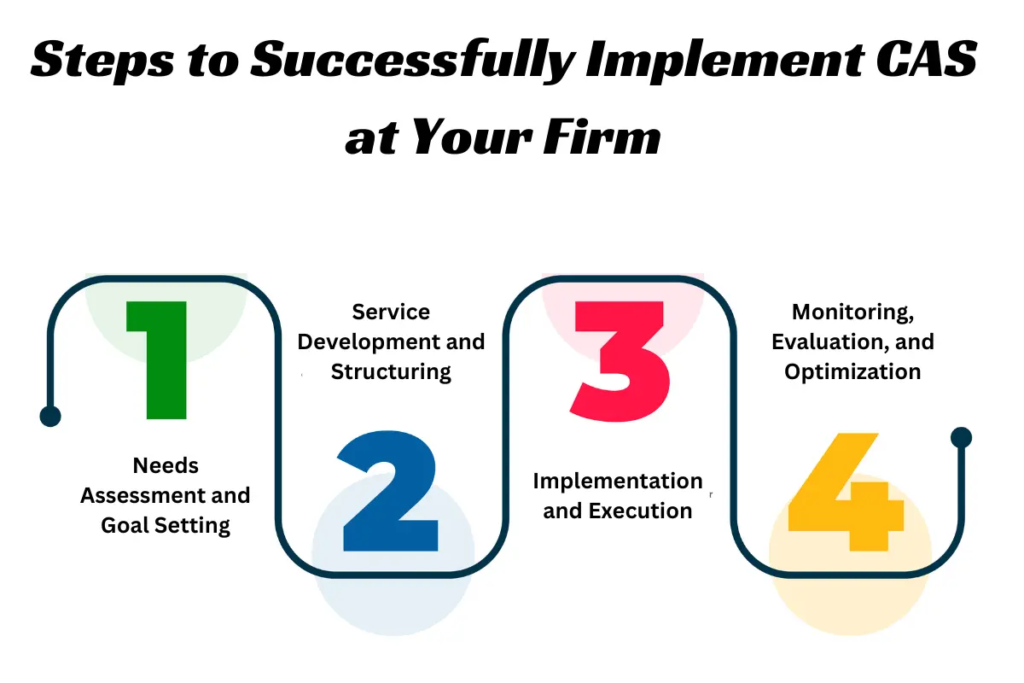In today’s fast-evolving business landscape, firms are no longer just number crunchers. They have evolved into strategic partners, offering Client Advisory Services (CAS) to help businesses make informed financial decisions. CAS goes beyond traditional accounting and auditing by providing value-driven insights, technology-driven solutions, and proactive financial guidance.
If you’re considering integrating accounting advisory into your firm’s offerings, this guide will walk you through what CAS entails and how to implement it successfully.
What are Client Advisory Services (CAS)?
Client Advisory Services (CAS) involve providing businesses with expert financial guidance, business insights, and strategic advice. Instead of just reporting numbers, CAS professionals analyze them to provide solutions that enhance profitability, efficiency, and growth.
Key Components of CAS
- Accounting Advisory: Helping businesses interpret financial statements and optimize processes.
- Accounting Financial Advisory: Providing insights into budgeting, forecasting, and financial planning.
- Due Diligence Services: Assisting firms with financial audits, risk assessments, and compliance.
- Business Process Automation: Implementing AI and cloud-based solutions for efficiency.
- Tax Planning & Compliance: Helping clients optimize tax liabilities and adhere to regulations.
Why Businesses Need CAS?
- Access to expert financial guidance
- Improved financial decision-making
- Increased efficiency through automation
- Regulatory and compliance assurance
- Competitive advantage in dynamic markets
Steps to Successfully Implement CAS at Your Firm

1. Needs Assessment and Goal Setting
Initial Firm Evaluation:
- Conduct an internal assessment to analyze your firm’s strengths, weaknesses, and readiness for client advisory services.
- Identify the expertise, technology, and resources required to offer advisory solutions.
Market and Client Needs Analysis:
- Research client demands, industry trends, and competitors’ offerings in accounting financial advisory, accounting advisory, and due diligence services in India.
- Gather insights on businesses that would benefit most from CAS.
Goal Alignment:
- Define clear, measurable, and achievable goals for launching CAS.
- Ensure goals align with your firm’s long-term vision and the value proposition you want to offer clients.
2. Service Development and Structuring
Strategy Development:
- Outline your core CAS service offerings, such as financial forecasting, tax advisory, and business consulting.
- Choose whether to specialize in accounting advisory or provide a broad range of advisory services.
Solution Design:
- Develop structured service packages tailored to different client needs.
- Implement advisory frameworks that integrate technology for better client insights.
Implementation Plan:
- Create a roadmap detailing the required resources, tools, and training programs for launching CAS.
- Assign responsibilities within the firm and set timelines for the rollout.
3. Implementation and Execution
Technology Integration:
- Deploy cloud-based accounting financial advisory tools for real-time financial monitoring.
- Use AI-driven financial analytics to automate routine tasks and improve advisory accuracy.
Staff Training and Certification:
- Train employees in financial consulting, business analysis, and advisory best practices.
- Encourage certification programs to boost credibility and expertise.
Client Onboarding and Service Launch:
- Educate existing and potential clients on the benefits of CAS.
- Begin offering advisory services to a pilot group before a full-scale rollout.
4. Monitoring, Evaluation, and Optimization
Performance Tracking:
- Regularly assess the success of CAS offerings by tracking client retention rates, revenue growth, and client satisfaction scores.
- Compare actual performance against predefined KPIs.
Feedback and Continuous Improvement:
- Collect client feedback to identify service gaps and areas for enhancement.
- Adapt strategies based on industry shifts, regulatory changes, and evolving client needs.
Scaling and Expansion:
- Expand CAS services as demand grows, incorporating new technologies and expertise.
- Develop partnerships or collaborations to strengthen advisory capabilities.
Final Thoughts
Integrating Client Advisory Services into your firm can help you transition from a traditional accountant to a strategic business partner. By leveraging technology, upskilling your team, and implementing proactive client engagement strategies, your firm can provide high-value accounting financial advisory and due diligence services in India and worldwide.
Need Expert CAS Services?
Looking to optimize your business with professional Client Advisory Services? Contact our expert team today!
FAQs
Q1. What is CAS Client Advisory services?
Client Advisory Services (CAS) refers to a range of strategic, financial, and accounting advisory solutions that help businesses make informed decisions.
Q2. What are CPA advisory services?
CPA Advisory Services are specialized consulting and strategic financial services provided by Certified Public Accountants (CPAs). These services go beyond traditional accounting and tax preparation, offering financial planning, risk management, business strategy, compliance guidance, and performance analysis to help businesses optimize operations and achieve long-term growth.
Q3. What is the purpose of advisory services?
The purpose of advisory services is to provide businesses with expert guidance, strategic insights, and data-driven solutions to improve decision-making, optimize performance, and achieve financial and operational goals. These services help clients navigate challenges, manage risks, and capitalize on growth opportunities.
Q4. What is CAS and what does it do?
Client Advisory Services (CAS) is a specialized offering that provides businesses with strategic financial insights, accounting advisory, and business consulting beyond traditional bookkeeping.
